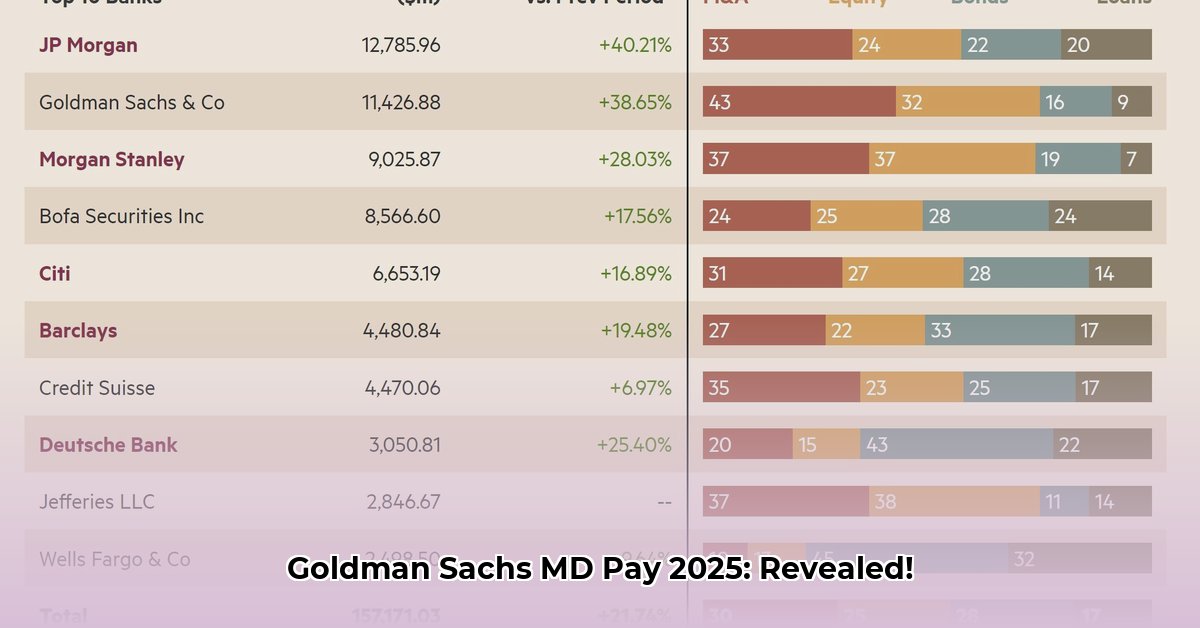
Goldman Sachs MD Compensation: Decoding the 2025 Landscape
Understanding the compensation of a Goldman Sachs Managing Director (MD) in 2025 requires a nuanced approach. While readily available data offers a glimpse, it's crucial to acknowledge limitations and contextual factors. Public sources, such as Glassdoor, suggest a wide range, from approximately $452,000 to $807,000 annually. However, this variability reflects the complex interplay of base salary, performance-based bonuses, and stock options. Isn't it fascinating how such a seemingly straightforward question reveals layers of complexity? The average base salary cited by Glassdoor sits around $313,000, but the variable components, averaging around $284,000, often significantly impact total earnings.
Understanding the Compensation Components: Beyond the Base Salary
The total compensation package for a Goldman Sachs MD is far from a simple number. The base salary forms the foundation, but it’s the performance-based bonuses and stock options that truly determine the final figure. These variable components are significantly influenced by individual performance and the firm's overall success. A highly successful year will yield a substantially larger bonus, highlighting the incentive structure at play. This performance-driven nature makes direct comparisons challenging and underscores the importance of considering various factors.
What percentage of total compensation do bonuses typically make up at Goldman Sachs for MDs? This information is rarely publicly released, illustrating the confidentiality surrounding high-level executive compensation.
Navigating Data Limitations: Accuracy and Interpretations
While online sources provide insights, it's crucial to acknowledge their limitations. Data from sources like Glassdoor, while useful, relies on self-reported information, introducing potential biases and inaccuracies. Therefore, the reported salary ranges should be interpreted as approximations, not precise figures. A comprehensive understanding requires a multi-faceted approach, incorporating information from multiple sources and acknowledging the inherent uncertainties.
How to Negotiate Goldman Sachs Managing Director Salary: A Strategic Framework
Successfully navigating salary negotiations at this level demands a strategic approach that considers both quantitative and qualitative factors. Here's a structured framework for a successful approach:
- Thorough Research: Conduct in-depth research on compensation ranges within your specific division and role, going beyond simple averages to understand the factors influencing variability.
- Quantifiable Achievements: Compile a comprehensive record of accomplishments, quantifying your contributions with concrete metrics and data to demonstrate exceeding expectations.
- Performance Metric Clarity: Gain a deep understanding of the specific performance metrics that influence your bonus and stock options. This knowledge is crucial for tailoring your negotiation strategy.
- Comprehensive Compensation Package: Focus your negotiation on the overall package, including bonuses, stock options, benefits, and other perks. A holistic approach maximizes your leverage.
- Rehearse Your Negotiation: Practice your negotiation skills through role-playing to anticipate counterarguments and formulate persuasive responses.
- Define Your Walk-Away Point: Establish a clear minimum acceptable compensation, ensuring you don't undervalue your contributions.
Beyond the Numbers: Cultural and Technological Factors
Beyond the financial aspects, elements like workplace culture and technology preferences play a significant role in employee satisfaction and retention. Employee feedback reveals that access to specific brokerage platforms and the company's stance on personal expression (like visible tattoos) might impact the overall work environment. These less quantifiable aspects should not be overlooked when assessing the true value of a Goldman Sachs MD position.
Addressing Data Reliability: A Risk Mitigation Approach
To mitigate the risk of relying on potentially unreliable or incomplete data, a multi-pronged approach is crucial.
| Risk Factor | Likelihood | Impact | Mitigation Strategy |
|---|---|---|---|
| Sample Bias (Glassdoor Data) | Medium | Medium | Cross-reference with multiple salary surveys and internal data (if accessible). |
| Model Inaccuracy | Medium | Medium | Regularly validate against independent sources and adjust accordingly. |
| Data Outdatedness | Low | Low | Frequent updates and continuous monitoring of compensation trends. |
| Omitted Variables (Compensation) | High | High | Comprehensive research considering various factors affecting compensation. |
The information provided here offers a starting point for understanding the complex world of Goldman Sachs MD compensation. However, a truly comprehensive understanding necessitates a deeper dive into specific roles, performance metrics, and internal company dynamics.